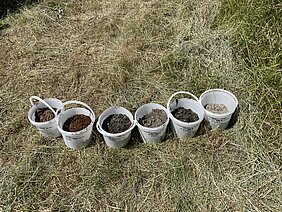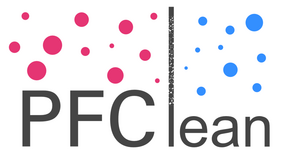The removal of per- and polyfluorinated substances (PFAS) from groundwater and soil t requires elaborate remediation strategies. In this project, four remediation techniques (funnel & gate, immobilization, forced mobilization, and thermal desorption) are applied and assessed with regard to their treatment efficiency.
Per- and polyfluorinated alkyl substances (PFAS) are a large group of chemicals that are ubiquitously found in the environment, persistent, partly bioaccumulative and toxic. The aim of the PFClean project is to develop methods for the remediation and removal of PFAS from soil and groundwater. There are major knowledge gaps regarding the removability of polyfluorinated substances (precursors) as well as environmentally relevant processes leading to mobile, perfluorinated and persistent transformation products. The focus is on the further development of the remediation methods "funnel & gate", "immobilization", "forced mobilization", and "thermal desorption". Thus, a broad field of applications with typical characteristics is included:
- Hydrogeological site characteristics in the vadose and saturated zone
- Point sources due to the use of firefighting foams and non-point sources on the example of PFAS-contaminated agricultural land
- Typical complex PFAS-containing compound mixtures and their transformation products
- Remediation technologies that are already in use and adapted to PFAS (funnel & gate) and technologies which still require further research for PFAS application (e.g. forced mobilization).
The PFClean project focusses on applying in-situ processes and following a holistic approach, whereby the intermediate transformation products plus the long-term consequences of PFAS contamination are identified and quantified. Additionally, the technical implementation and economic feasibility of methods applied to remove PFAS from the subsurface are investigated.
In lab-scale experiments, TZW investigates the influence of electrical polarisation on the sorption capacity of short-chain perfluorosulfonic and perfluorocarboxylic acids on activated carbon. The obtained process parameters provide the basis for field application in a funnel and gate system. In microcosm experiments, the delayed release of PFAS is tested, aiming to reduce the transformation of PFAS in the soil by sorptive interactions and to improve the long-term stability of adsorbed precursors. In addition, the improvement of the biological transformation of strongly adsorbed precursors into mobile transformation products is investigated in order to enable a faster discharge of PFAS. For the evaluation of the process developments in pilot and field application, a monitoring programme will be set up and carried out. The monitoring of PFAS contamination is carried out by means of PFAS target analysis and sum parameters (EOF, AOF), as well as after digestion in the TOP assay. In addition analytical techniques are also being further optimized.
Publication:
Frank Thomas Lange, Finnian Freeling, Bernd Göckener: Persulfate-based total oxidizable precursor (TOP) assay approaches for advanced PFAS assessment in the environment – A review, Trends in Environmental Analytical Chemistry, Volume 44, Dec. 2024

![[Translate to English:] Prüfstelle-Produktprüfung_Teststand Test centre and product testing](/fileadmin/_processed_/0/9/csm_TZW-Karlsruhe_Pruefung_Geraete-Teststand_377188946c.jpg)

























